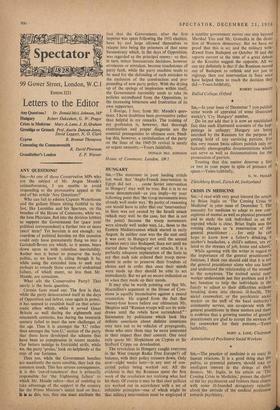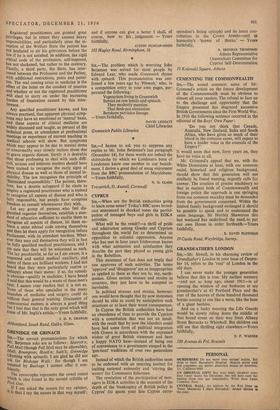SIR,—The practice of medicine is an essay in human relations.
It is a good thing that the public, as potential patients, should take an intelligent interest in the doings of theft doctors. Mr. Inglis, in his article on 'The Coming Crisis in Medicine,' presses the claims of the lay psychiatrist and bolsters these claims with some ill-founded derogatory remarks about the attitude of the medical profession towards psychiatry.
Registered practitioners are granted great privileges, but in return they assume heavy responsibilities, and particularly since the in- ception of the Welfare State the patient has not hesitated to air his grievances before the law if he is not satisfied. In addition, the rigid ethical code of the profession, self-imposed, has not slackened, but rather to the contrary. Finally, a third party, the State, has inter- vened between the Profession and the Patient, with additional restrictions, pains and penal- ties. The real coming crisis in medicine is the effect of the latter on the conduct of practice and whether or not the registered practitioner will elect to carry on under the increasing burden of frustration caused by this inter- ference.
Any qualified practitioner knows, and has always practised, that apparent physical symp- toms may have an emotional or 'mental' basis, and these aspects of clinical medicine are Widely discussed and taught, as perusal of the technical press, or attendance at professional meetings or experience of current teaching in Medical schools will show. But symptoms which may appear to be due to mental stress or abnormality may closely imitate those due to grave organic disease. Surely it is desirable that those professing to deal with such diffi- cult, serious and intimate matters should have been trained to recognise the early signs of Physical disease as well as those of mental in- stability. The law recognises the principle of diminished responsibility.' The patient, there- fore, has a double safeguard if he elects to employ a registered practitioner who is trained to recognise all aspects of disease and who is fully responsible, but people have complete freedom to consult whomsoever they wish.
Let any group of persons who feel dis- gruntled organise themselves, establish a stan- dard of education sufficient to enable them to recognise all aspects of disease, let them en- force a strict ethical code among themselves and then let them apply for recognition before Parliament, with its attendant burdens. What- ever they may call themselves they will in fact be fully qualified medical practitioners, and I ant sure that they will be welcomed as such. the lay psychiatrist, so far as I am aware, is a respected and useful medical auxiliary, and heard of them are brilliant workers. I had not neard that they were particularly restive or unhappy about their status : if so, the remedy 18 obvious—qualify in medicine. I have heard It said that this would be a waste of these men's dine. I assure your readers that it is not so. {None of those who specialise in the many branches of medicine and surgery could do without their general training. Discussion of controversial matters is always a good thing but I feel that that is the only good which will come of Mr. Inglis's article.—Yours faithfully, J. D. P. GRAHAM
Abbotsford. South Road, Gulby, Glam.



































 Previous page
Previous page